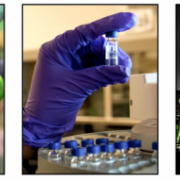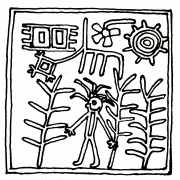Competition Launch to ‘Brand’ Synthetic Biology Vanilla
Enviado por Joëlle Deschambault el
ETC Group and Friends of the Earth are launching a public design and branding competition to shine a spotlight on synthetic biology (extreme genetic engineering) in our food. Use your creativity to help us expose the very un-natural new ingredient coming to a confection near you, and what it means for vanilla farmers.
Climate Summit: Don't turn farmers into 'climate smart' carbon traders!
Enviado por Veronica Villa el
Farmers produce food, not carbon. Yet, if some of the governments and corporate lobbies negotiating at the UN climate change conference to be held in Warsaw from 11-22 November have their way, farmland could soon be considered as a carbon sink that polluting corporations can buy into to compensate for their harmful emissions.
Cumbre climática: no conviertan a los campesinos en traficantes de carbono
Enviado por Veronica Villa el
Los campesinos y campesinas producen alimentos, no carbono. No obstante, si se salen con la suya algunos de los grupos de cabildeo de las corporaciones y los gobiernos que negocian en la conferencia de cambio climático que se llevará a cabo en Varsovia entre el 11 y el 22 de noviembre, la tierra de cultivo podría ser considerada como sumidero de carbono que las corporaciones contaminantes pueden comprar para compensar sus dañinas emisiones.
Buenas noticias en el Día de la Alimentación: ¡Murieron las semillas suicidas! …por el momento
Enviado por Joëlle Deschambault el
La pequeña gran noticia del Día de la Alimentación es que el Congreso de Brasil retiró hoy de la agenda la deliberación sobre un proyecto de ley que hubiera permitido la venta y uso de la tecnología Terminator, a partir de las preocupaciones expresadas por la movilización nacional e internacional en oposición a la iniciativa. Incluso, el presidente de la comisión que lo tenía para discutir se comprometió a que mientras él estuviera a cargo, no permitiría que el proyecto de ley regresara a la agenda.
Good News for World Food Day: Suicide Seeds Are Dead…for the moment
Enviado por Joëlle Deschambault el
In a great bit of news for World Food Day, a key Brazilian congressional committee today withdrew the consideration of legislation that would have allowed the sale and use of Terminator Technology, also known as suicide seeds. The Constitutional Commission of the Brazilian House of Representatives was slated to consider Bill PL 268/2007 this morning, but decided instead to withdraw it from the agenda – taking into account the social concerns raised by the national and international mobilization in opposition to the bill. Further, the President of the Commission pledged that as long as he is at the helm, he will not allow the bill back on the agenda.
Páginas
Recent Blogs
Thanks for your solidarity with the Indigenous Gathering of the Americas / Gracias por su solidaridad con el Encuentro Indígena de las Américas
Enviado por Charlie el
Industry Tries to Repeal Brazil's National Ban on Terminator
Enviado por Charlie el
In the past, several multinational seed corporations have publicly pledged not to commercialize Terminator seeds - but, not surprisingly, there is intense industry pressure to overturn Brazil's national law prohibiting suicide seeds. Bill number 268 (2007) in the Brazilian Congress proposes to:
Biofuels and Transgenics
Enviado por Silvia Ribeiro el
Below you will find a series of articles on biofuels, originally written in Spanish by one of ETC Group’s researchers. (Unfortunately, English translations are not always available). Biofuel production is currently a much-debated topic in Latin America. The prominent farmers’ organizations in the region believe that the production of biofuels will lead to further marginalization and erosion of the lands which are currently being used for food production.
Agrocombustibles y lógicas perversas
Enviado por Silvia Ribeiro el
*Silvia Ribeiro Una de las muestras más claras de las lógicas perversas del capitalismo es el empuje que desde gobiernos y trasnacionales se da a la producción industrial de agrocombustibles, principalmente etanol y biodiesel. La mayoría de los enunciados de esta campaña -mediática, política y subsidiada con recursos públicos- son falsos. Lo que sí es verdad es que el capitalismo aprovecha los desastres que provoca para generar nuevos negocios. Y como éstos generan nuevos desastres, entonces habrá nuevos negocios.
Agro-combustibles versus soberanía alimentaria
Enviado por Silvia Ribeiro el
Silvia Ribeiro* Malí, que alojó en febrero 2007 el Foro Mundial de Soberanía Alimentaria “Nyéléni”, es uno de los diez países más pobres del mundo, si se mide en dinero. Sin embargo el país tiene recursos como oro y algodón —del cual es uno de los principales productores del continente—, pero la herencia colonial y las imposiciones de la Organización Mundial de Comercio, el FMI y el Banco Mundial han sumido a su población en la miseria. Aún así, Malí sigue siendo un país rico.
La locura de los agrocombustibles
Enviado por Silvia Ribeiro el
Silvia Ribeiro* Cada vez más queda más claro que los agrocombustibles no solamente no son una panacea ambiental para enfrentar el cambio climático, sino por el contrario, lo van a empeorar. Al mismo tiempo van sentando las bases para nuevas crisis alimentarias y de escasez de agua, junto a la expulsión de campesinos e indígenas de sus tierras, todo ello con amplias repercusiones económicas, sociales y ambientales negativas, principalmente para las poblaciones del tercer mundo.
No Substance to SBSTTA’s Recommendations as Debate on Agrofuels and Geoengineering Fizzles
Enviado por Charlie el
ETC Group attended the 12th meeting of the scientific advisory body (SBSTTA) to the Convention on Biological Diversity (CBD), which met in Paris 2-6 July 2006. Expectations were high that SBSTTA would tackle new and emerging issues on its agenda: agrofuels (a.k.a. biofuels) and climate change. Despite the urgency of these matters, some governments managed to block meaningful recommendations and put a chill on biodiversity’s hottest topics.
Iron flakes - more on Planktos Inc. and ocean iron fertilization - (En español abajo)
Enviado por Silvia Ribeiro el
You'd think that after some of the world’s most eminent marine biologists attacked it; the IPCC report dumped on it; and the IMO’s scientific group to the London Convention last week passed the equivalent of an emergency motion advising it not to proceed - that Planktos Inc. would go to ground or hoist a white flag before it sinks in embarrassment.
Meanwhile back in Corporate Synbioville...
Enviado por Jim Thomas el
The BP-Berkeley deal, the new joint Bio Energy institute, and also the recent job hop by John Menlo of BP fuels to Amyris Biotech - are all extra strings tying the interests of the Syn Bio community as a wholeever closer to the interests of big business. It should be noted that in each of thse cases CEO Keasling plays a central role. The same man who claims to be developing Synthetic Biology to serve the worlds poor (via synthetic artemisinin) seems to be rather busy these days serving the fabulously rich.
Parting with parts
Enviado por Jim Thomas el
"I think this is going to become the foundational technology of the 21st century" - that was the triumphant message with which Tom Knight of MIT brought Synthetic Biology 3.0 to an end today. An engineering generalist who moved from artificial intelligence to artificial life, it was Knight who, along with Drew Endy, developed the concept of biobricks -- snap-together genetic parts from which to assemble Lego-like genes.



